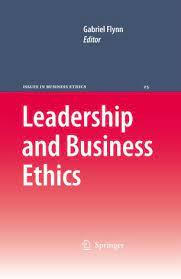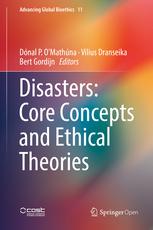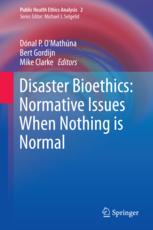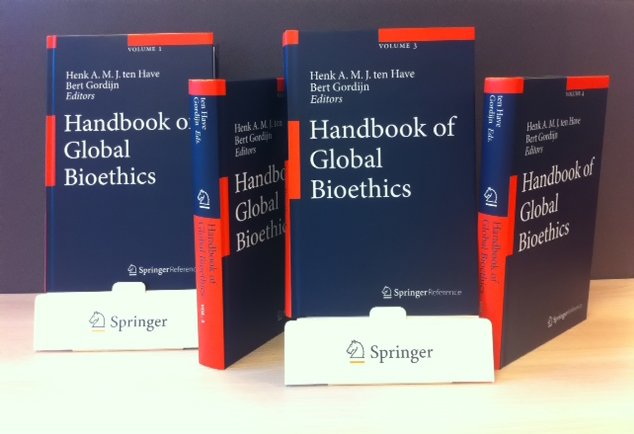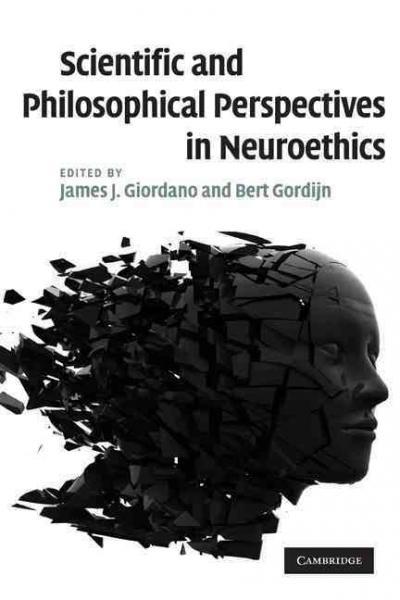
Publications
Challenges to the Global Issue of End of Life Care
2022 Springer, New York. Editors: Pierre Mallia, Nathan Emmerich, Bert Gordijn, Francesca Pistoia
This book addresses the problems faced by people and hospitals dedicated to providing optimal end-of-life care and asks whether ethicists can function as experts on this subject. Though ethics consultation is a growing practice in medical contexts, difficult questions surrounding the role of ethicists in professional decision-making remain. The chapters in this book examine the nature and plausibility of moral expertise, the relationship between character and expertise, the nature and limits of moral authority, the question of how one might become a moral expert, and the trustworthiness of moral testimony. This volume not only engages with the growing literature in the debate on end-of-life care but also offers new perspectives from both academics and practitioners. Such perspectives include ways on how to get together to optimize end-of-life care. This book is of particular interest to bioethicists, clinicians, ethics committees, students of social epistemology, patient groups, and institutions, especially religious, who may not be sufficiently imparting the social teachings of end-of-life care. It also shows how they are indeed stakeholders for what is today called ‘a good death’. These new essays advance discussions and provide practical information on dying as well as acting as a guide to those interested in actively effecting change.
Leadership and Business Ethics
2022 Springer, New York. Editor: Gabriel Flynn
This book offers new and challenging approaches to business ethics that successfully link theory and practice thereby overcoming lacunae and inadequacies in much of the literature concerning ethics and governance, a theme that recurs with remarkable frequency in the history of business ethics as an academic discipline. This work provides imaginative and innovate proposals for the indispensable coupling of virtue, integrity, and character with global business, finance, and banking. The volume seeks to overcome the marginal status of business ethics in universities, business, and enterprise by demonstrating that virtue ethics is an important step in the direction of an adequate response to the leadership issue. This new edition of a popular work points to new ways of achieving an ever more urgent coalescence of ethics and business. It proposes practical advice and viable suggestions to business people on what is right and wrong in business. The volume makes a vital contribution in the area of education that should serve the ongoing development of top leaders. In the important domain of women in leadership, the volume provides new solutions that break boundaries on the global stage. The work challenges unethical marketing of human images with important implications for citizenship and society. The volume contains creative suggestions for the use of spirituality and human development for the enhancement of business and society. The significantly extended second edition includes an exciting line up of leading academics and practitioners in the audacious hope that something may change for the better in the realms of business and banking.
Contemporary European Perspectives on the Ethics of End of Life Care
2020 Springer, New York. Editors: Nathan Emmerich, Pierre Mallia, Bert Gordijn and Francesca Pistoia
This book examines the ethics of end of life care, focusing on the kinds of decisions that are commonly made in clinical practice. Specific attention is paid to the intensification of treatment for terminal symptoms, particularly pain relief, and the withdrawal and withholding of care, particularly life-saving or life-prolonging medical care. The book is structured into three sections. The first section contains essays examining end of life care from the perspective of moral theory and theology. The second sets out various conceptual terms and distinctions relevant to decision-making at the end of life. The third section contains chapters that focus on substantive ethical issues. This format not only provides for a comprehensive analysis of the ethical issues that arise in the context of end of life care but allows readers to effectively trace the philosophical, theological and conceptual underpinnings that inform their specific interests. This work will be of interest to scholars working in the area as well as clinicians, specialists and healthcare professionals who encounter these issues in the course of their practice.
The Ethics of Cybersecurity
2020 Springer, New York
Editors: Markus Christen, Bert Gordijn and Michele Loi
This open access book provides the first comprehensive collection of papers that provide an integrative view on cybersecurity. It discusses theories, problems and solutions on the relevant ethical issues involved. This work is sorely needed in a world where cybersecurity has become indispensable to protect trust and confidence in the digital infrastructure whilst respecting fundamental values like equality, fairness, freedom, or privacy. The book has a strong practical focus as it includes case studies outlining ethical issues in cybersecurity and presenting guidelines and other measures to tackle those issues. It is thus not only relevant for academics but also for practitioners in cybersecurity such as providers of security software, governmental CERTs or Chief Security Officers in companies.
Disasters: Core Concepts and Ethical Theories
2018 Springer, New York
Editors: Donal O'Mathuna, Dranseika, Vilius and Bert Gordijn
This Open Access Book is the first to examine disasters from a multidisciplinary perspective. Justification of actions in the face of disasters requires recourse both to conceptual analysis and ethical traditions. Part 1 of the book contains chapters on how disasters are conceptualized in different academic disciplines relevant to disasters. Part 2 has chapters on how ethical issues that arise in relation to disasters can be addressed from a number of fundamental normative approaches in moral and political philosophy. This book sets the stage for more focused normative debates given that no one book can be completely comprehensive. Providing analysis of core concepts, and with real-world relevance, this book should be of interest to disaster scholars and researchers, those working in ethics and political philosophy, as well as policy makers, humanitarian actors and intergovernmental organizations.
Disaster Bioethics: Normative Issues When Nothing is Normal
2014 Springer, New York
Editors: Donal O'Mathuna, Bert Gordijn and Michael Clarke
This book provides an early exploration of the new field of disaster bioethics: examining the ethical issues raised by disasters. Healthcare ethics issues are addressed in the first part of this book. Large-scale casualties lead to decisions about who to treat and who to leave behind, cultural challenges, and communication ethics. The second part focuses on disaster research ethics. With the growing awareness of the need for evidence to guide disaster preparedness and response, more research is being conducted in disasters. Any research involving humans raises ethical questions and requires appropriate regulation and oversight. The authors explore how disaster research can take account of survivors? vulnerability, informed consent, the sudden onset of disasters, and other ethical issues. Both parts examine ethical challenges where seeking to do good, harm can be done. Faced with overwhelming needs and scarce resources, no good solution may be apparent. But choosing the less wrong option can have a high price. In addition, what might seem right at home may not be seen to be right elsewhere. This book provides in-depth and practical reflection on these and other challenging ethical questions arising during disasters. Scholars and practitioners who gathered at the Brocher Foundation in Geneva, Switzerland in 2011 offer their reflections to promote further dialogue so that those devastated by disasters are respected by being treated in the most ethically sound ways possible.
In Pursuit of Nanoethics
2014 Springer, New York
Editors: Bert Gordijn and Anthony Mark Cutter
This volume assembles an interdisciplinary team of leading academics, industry figures, policymakers and NGO’s to consider the legal, ethical and social issues that are raised by innovations in nanoscience and nanotechnology. By bringing together international experts from a diverse range of fields this volume addresses the implications and impact that nanotechnology has on society. Through the exploration of six key themes the contributors analyse both the impact of nanotechnology and the emergence of the concept of nanoethics. Each section includes authors from both sides of the political and scientific divide – incorporating both positive and negative perspectives on nanotechnology, as well as including discussions of associated concepts such as converging technologies. The result provides for the widest and most balanced discussion of these issues to date.
Handbook of Global Bioethics (4 volumes)
2014, Springer, New York
Editors: Henk Ten Have and Bert Gordijn
As the first of its kind, this handbook presents state-of-the-art information and analysis concerning the state of affairs in bioethics in approximately 50 countries. The country reports point out the most important discussions as well as the emerging topics in the field. Readers can orientate themselves quickly as regards the various relevant issues, institutional structures and expertise available in these countries. The authorship of this reference work is truly global as it involves contributions from the best authors with innate knowledge of the bioethics situation in these countries.
Biobanks and Tissue Research
2011 Springer, New York
Editors: Christian Lenk, Judit Sandor and Bert Gordijn
The research field of biobanks and tissue research is highly promising. Many projects around the globe are involved in the collection of human tissue and health data for research purposes. These initiatives are driven by the perspective of decisive breakthroughs in the knowledge of the genetic pathways involved in widespread diseases. However, there are considerable ethical and legal challenges to be considered as well. These challenges encompass the use of body material for research purposes, the misuse of genetic and other health data by third parties, trust in science and medicine, concerns regarding privacy, use of genetic data for forensic applications by the state and the police, and regulatory issues. This volume is divided into three parts: the inclusion of the public, the rights of donors and patients, examples and recommendations for the future of tissue research. It presents a comprehensive overview of the most important topics in the field by renowned scholars in medical ethics and biolaw.
Scientific and Philosophical Perspectives in Neuroethics
2010 Cambridge University Press
Editors: James J. Giordano and Bert Gordijn
While neuroscience has provided insights into the structure and function of nervous systems, hard questions remain about the nature of consciousness, mind, and self. Perhaps the most difficult questions involve the meaning of neuroscientific information, and how to pursue and utilize neuroscientific knowledge in ways that are consistent with some construal of social 'good'. Written for researchers and graduate students in neuroscience and bioethics, Scientific and Philosophical Perspectives in Neuroethics explores important developments in neuroscience and neurotechnology, and addresses the philosophical, ethical, and social issues and problems that such advancements generate. It examines three core questions. First, what is the scope and direction of neuroscientific inquiry? Second, how has progress to date affected scientific and philosophical ideas, and finally, what ethical issues and problems does this progress and knowledge incur, both now and in the future?
Ethik in Klinik und Pflegeeinrichtung – ein Arbeitsbuch
2010 (3rd ed.) Hermann Luchterhand Verlag, Neuwied, Köln, München
Authors: Norbert Steinkamp and Bert Gordijn
Mitarbeiterinnen und Mitarbeiter in Klinik und Pflegeeinrichtung stehen häufig in einem Spannungsfeld zwischen ihrer beruflichen Verantwortung, mittels guter Behandlung und Pflege Menschen zu helfen und der Tatsache, dass dies durch Zeit- und Mittelknappheit erschwert wird. Ethische Probleme bedürfen der Besprechung und sachgerechten Behandlung, sowohl in der Praxis auf Station als auch bei Entscheidungen auf Einrichtungsebene. Zu diesem Zweck wird in vielen Krankenhäusern und Pflegeeinrichtungen mit Ethikkomitees und ethischer Fallbesprechung gearbeitet. Das nunmehr in dritter Auflage aktualisierte Buch bietet einen integrativen Ansatz für die Entwicklung dieser Instrumente, für den Umgang mit ihnen sowie für die Interaktion zwischen ihnen im Rahmen einer lernenden Organisation.
Medical Enhancement and Posthumanity
2008 Springer, New York
Editors: Bert Gordijn and Ruth Chatwick
As we are increasingly using new technologies to change ourselves beyond therapy and in accordance with our own desires, understanding the challenges of human enhancement has become one of the most urgent topics of the current age. This volume contributes to such an understanding by critically examining the pros and cons of our growing ability to shape human nature through technological advancements. The authors undertake careful analyses of decisive questions that will confront society as enhancement interventions using bio-, info-, neuro- and nanotechnologies become widespread in the years to come. They provide the reader with the conceptual tools necessary to address such questions fruitfully. What makes the book especially attractive is the combination of conceptual, historical and ethical approaches, which makes it highly original. In addition, the well-balanced structure of the volume allows both favourable and critical views to be voiced. Moreover, the work has a crystal clear structure. As a consequence, the book is accessible to a broad academic audience. The issues raised are of interest to a wide reflective public concerned about science and ethics, as well as to students, academics and professionals in areas such as philosophy, applied ethics, bioethics, medicine and health management.
The International Library of Ethics, Law and Technology
Springer New York; Series editors: Bert Gordijn and Sabine Roeser
Technologies are developing faster and their impact is bigger than ever before. Synergies emerge between formerly independent technologies that trigger accelerated and unpredicted effects. Alongside these technological advances new ethical ideas and powerful moral ideologies have appeared which force us to consider the application of these emerging technologies. In attempting to navigate utopian and dystopian visions of the future, it becomes clear that technological progress and its moral quandaries call for new policies and legislative responses. Against this backdrop this new book series from Springer provides a forum for interdisciplinary discussion and normative analysis of emerging technologies that are likely to have a significant impact on the environment, society and/or humanity. These will include, but be no means limited to nanotechnology, neurotechnology, information technology, biotechnology, weapons and security technology, energy technology, and space-based technologies.
Advancing Global Bioethics
Springer New York; Series editors: Henk ten Have and Bert Gordijn
The book series Global Bioethics provides a forum for normative analysis of a vast range of important new issues in bioethics from a truly global perspective and with a cross-cultural approach. The issues covered by the series include among other things sponsorship of research and education, scientific misconduct and research integrity, exploitation of research participants in resource-poor settings, brain drain and migration of healthcare workers, organ trafficking and transplant tourism, indigenous medicine, biodiversity, commodification of human tissue, benefit sharing, bio-industry and food, malnutrition and hunger, human rights, and climate change.
SpringerBriefs in Ethics
Springer New York; Series editors: Gordijn, B., ten Have, H., Cowton, Ch., Hartman, L., Werhane, P., Hattingh, J., DesJardins, J., Newton, L., Korthals, M., Arda, B., Solbakk, J. H., Mordini, E., Hongladarom, S
Springer Briefs in Ethics envisions a series of short publications in areas such as business ethics, bioethics, science and engineering ethics, food and agricultural ethics, environmental ethics, human rights and the like. The intention is to present concise summaries of cutting-edge research and practical applications across a wide spectrum. Springer Briefs in Ethics are seen as complementing monographs and journal articles with compact volumes of 50 to 125 pages, covering a wide range of content from professional to academic. Typical topics might include: Timely reports on state-of-the art analytical techniques; A bridge between new research results, as published in journal articles, and a contextual literature review; A snapshot of a hot or emerging topic; In-depth case studies or clinical examples; Presentations of core concepts that students must understand in order to make independent contributions.
Medicine, Health Care and Philosophy
Editors-in-chief: Bert Gordijn and Henk ten Have
Medicine, Health Care and Philosophy: A European Journal is the official journal of the European Society for Philosophy of Medicine and Health Care. It provides a forum for international exchange of research data, theories, reports and opinions on bioethics, and the philosophy of medicine and health care in general. The journal promotes interdisciplinary studies, and stimulates international exchange. Particular attention is paid to developing contributions from all European countries, and to making accessible scientific work and reports on the practice of health care ethics, from all nations, cultures and language areas in Europe.
The journal covers history, ethics, anthropology, epistemology, logic, metaphysics, philosophy of science and technology, sociology and political science, law, and the philosophy of culture and religion, centered on a common object of reflection: health care, the human effort to deal with disease, illness, death as well as health, well-being and life.


